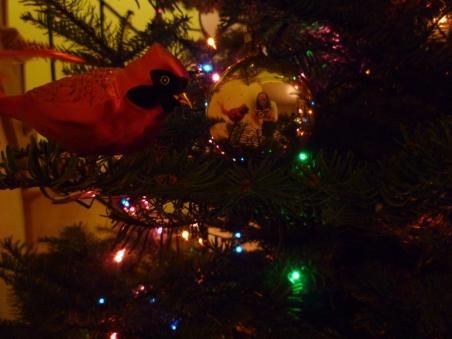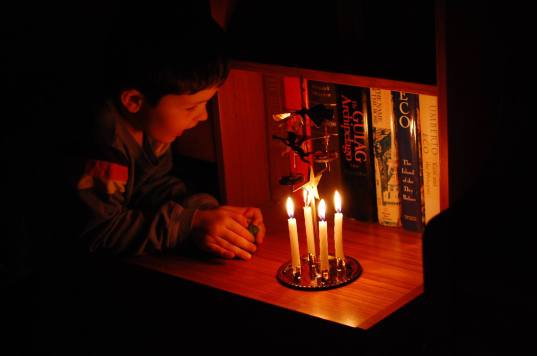I am learning to live, glory to God — though I’d never thought of it just that way until reading this poem. Its allusions to giving birth I can relate to, though I’m thankful I was able to accomplish the material form of that work when I was in the “glory of the flesh,” young and strong. Now that I am in the autumn of my life, now is when as a widow I have to rise to the less tangible demands, which before I had thought of more as a re-creation than a rebirth.

It used to be that January was the dark dream of the year for me, but judging from the last few weeks, I think that in the years to come the ramp-up to Christmas might prove to be the season when it’s hardest to stay tuned to Christ’s birth in me, as He,
At the iron senseless time, comes
To force the glory into frozen veins…
Maybe it’s a stretch to apply these metaphors to my situation. But all the traditions of getting ready for Christmas — the planning for gifts, the shopping and cooking and decorating, Christmas caroling, all in a context of wood fires and sweeping of leaves and walks on brisk mornings — I have to learn to live on my own now. “Everything changes,” and I have been born into a new and strange existence. The natural impulse is to wish to sleep ever and to dream of springtimes past.
But as Christ is born in me moment by moment, I’m the farthest possible from “on my own.” If I could live in this reality, truly live in Him, instead of in the unreality of memories that are phantoms (human beings themselves can never fall into the category of Memories), it would be a constant breaking out in a glorious freedom that encompasses calm and warmth and joy, the fullness of God. I’m in the process — I am being born, ever so slowly:
To bear new life or learn to live is an exacting joy:
The whole self must waken; you cannot predict the way
It will happen, or master the responses beforehand.
For any birth makes an inconvenient demand…
I feel that I could feed off this rich poem for the next several months! It is a great gift to me; I hope you enjoy it, too. May your Advent waiting be fruitful.

CHRISTMAS AND COMMON BIRTH
Christmas declares the glory of the flesh:
And therefore a European might wish
To celebrate it not at midwinter but in spring,
When physical life is strong,
When the consent to live is forced even on the young,
Juice is in the soil, the leaf, the vein,
Sugar flows to movement in limbs and brain.
Also before a birth, nourishing the child
We turn again to the earth
With unusual longing—to what is rich, wild,
Substantial: scents that have been stored and strengthened
In apple lofts, the underwash of woods, and in barns;
Drawn through the lengthened root; pungent in cones
(While the fir wood stands waiting; the beech wood aspiring,
Each in a different silence), and breaking out in spring
With scent sight sound indivisible in song.
Yet if you think again
It is good that Christmas comes at the dark dream of the year
That might wish to sleep ever.
For birth is awaking, birth is effort and pain;
And now at midwinter are the hints, inklings
(Sodden primrose, honeysuckle greening)
That sleep must be broken.
To bear new life or learn to live is an exacting joy:
The whole self must waken; you cannot predict the way
It will happen, or master the responses beforehand.
For any birth makes an inconvenient demand;
Like all holy things
It is frequently a nuisance, and its needs never end;
Freedom it brings: We should welcome release
From its long merciless rehearsal of peace.
So Christ comes
At the iron senseless time, comes
To force the glory into frozen veins:
His warmth wakes
Green life glazed in the pool, wakes
All calm and crystal trance with the living pains.
And each year
In seasonal growth is good — year
That lacking love is a stale story at best
By God’s birth
Our common birth is holy; birth
Is all at Christmas time and wholly blest.
-Anne Ridler
(Bottom photo by Pippin)
I am going to save the Ridler poem for later…I am still soaking in what my dear friend wrote.
LikeLiked by 3 people
What a glorious & moving poem! Very affecting. Thank you.
LikeLiked by 1 person
Dear Gretchen ~ this post spoke to me and I thank you for sharing this poem.
‘His warmth wakes’ me each day in my widow journey. I want to rest more in His tender love and care and to ‘waken’ to His gentle prodding in this widow walk to talk with Him, continuously.
Love, hugs & prayers for you ~ FlowerLady
LikeLiked by 1 person
I agree with Jeannette. Some things are best said in direct language. You are taking charge with sentences again. And that gets transmitted to us behind our screens.
I want to read the poem carefully later. (I didn’t know about Anne Ridler’s work. Thank you! I’m going to look for more, but this one will be just right for my heart right now.)
LikeLiked by 1 person
So very much to attempt to take in, here….A profound post and poem. I loved the part where you say, “But as Christ is born in me moment by moment, I’m the farthest possible from ‘on my own.'”
LikeLiked by 1 person
Wow, this is a wonderful poem- so much is in here! I love it!
LikeLiked by 1 person
I’ve never been big on poetry, but some things just reach you easily, don’t they? This woman has such a way with imagery.
LikeLiked by 1 person
The line that touched me most was this:
So Christ comes
At the iron senseless time, comes
To force the glory into frozen veins…
It calls to mind the wonderful poem/hymn “In the Bleak Mid-winter,” with its lines about “earth stood hard as iron, water like a stone.” Perhaps this poet took that in, and transformed it. Perhaps it’s only one of those metaphors that forces itself on many of us.
But isn’t it true that grief of any sort, the shock of loss and being overcome by events, can leave us senseless, frozen in our tracks, as the saying goes? It takes time for melting to take place, for us to waken and stir back to life. But it can happen.
LikeLiked by 1 person
When you have a rich tapestry of literature in your mind the way you do, Linda, it makes every new encounter richer for all of the possible associations and allusions. Thank you for sharing this one!
LikeLike
This is beautiful!
LikeLiked by 1 person